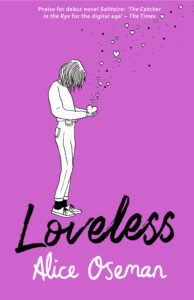By Jay Flood

It’s rare to find a book written about college students that captures the experience so well. Loveless by Alice Oseman is about belonging, accepting yourself, and growing to love your community. I truly did not expect this young adult contemporary fiction novel to make me emotional, but it did. Getting to experience Georgia navigate complicated feelings and realize she is different than everyone else was comforting and validating. I normally don’t like character-driven books, but this one made me feel seen in a way I never expected.
The book begins with Georgia, Pip, and Jason at their high school prom, where Georgia decides to try and kiss the boy she’s had a crush on for years. However, right as it’s about to happen, she pulls away and realizes she is so grossed out and has been faking the crush all that time. When she and her friends arrive at university, Georgia is embarrassed about being the only person who hasn’t had their first kiss. Her roommate tries to help her flirt and kiss someone at a club, but Georgia is, again, grossed out. She starts realizing she’s never had a crush on anyone, boys or girls.
The confusion, fear, and isolation Georgia felt trying to figure out her sexuality was captured in such a real and honest way. Even though Georgia’s experience doesn’t describe everyone’s, it was still great representation for people who are asexual and aromantic (aroace) and a good example for people who might not fully understand what that means, as long as you recognize that even that exists on a spectrum and is different for everyone. Georgia learns to accept herself for who she is and finds a community that celebrates differences.
Although all of that is enough to make me emotional, what truly made me cry was the love she has for her friends and roommate and the love they have for her. It’s difficult to explain why the found family and platonic relationship aspect of the book made me emotional, but it made me feel pure joy. Georgia’s friends all have their own subplots, as well. The characters are all deeply flawed, definitely make mistakes, and can be a bit annoying, but they feel so real which makes them so lovable.
This book represented a lot of marginalized communities and had diverse characters, which also made the book feel very real and validating. Although I enjoyed seeing a variety of diverse characters rather than having only one character be different, like in other books, there are people who criticize the book for not showing enough diverse experiences. For example, Georgia’s experience with being aroace is not every aroace person’s experience, and some say the book makes it seem like it is. Another example is that the only nonbinary character is said to use he/they pronouns, which means that character uses both he/him and they/them pronouns, but not once does another character use they/them pronouns for them.
Another complaint about the characters was that a lot of side characters only existed to be used by Georgia. When trying to figure out her sexuality, she treats her best friends, Pip and Jason, really badly. She also uses Sunil, the nonbinary character who is Indian, to do her emotional labor. Sunil’s only role in the book is to explain and educate Georgia on the LGBTQ+ community and help her navigate her own identity. A lot of the side characters, who could have had so much more depth and development, were only used to help Georgia. I understand exactly what those people mean, but when I first read the book, I didn’t feel that way.
Although the characters could be very unlikeable, I felt I connected with them in a way I haven’t in other books. They all felt so real and I cared about the issues they were facing. Experiencing these characters navigate university for the first time was also comforting. It’s not often any form of media accurately represents what university is like, so reading about them moving in, meeting roommates, joining clubs, making friends, and going to events was something I never realized I wanted to read about. The awkwardness, insecure internal thoughts, uncomfortableness with unfamiliarity, and the feeling of not belonging helped me realize I wasn’t alone in that. I felt so seen and represented by this book, even though my experience wasn’t exactly what she went through.
If you’re feeling lost or like you don’t belong, this book is the perfect book to read. Loveless by Alice Oseman perfectly captures what it’s like to come to terms with being different, romanticize platonic love, and find a place you belong. The average rating on Goodreads is 4.25 stars, but I gave it five stars after being pleasantly surprised with how good it made me feel. Even if contemporary fiction isn’t something you normally read, this book should be an exception.
